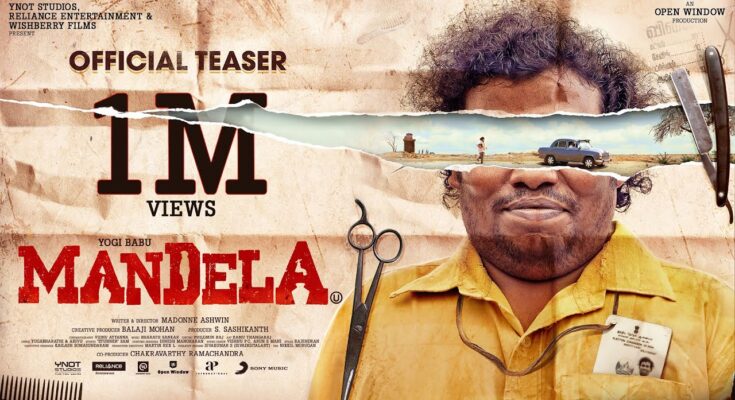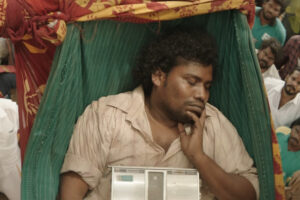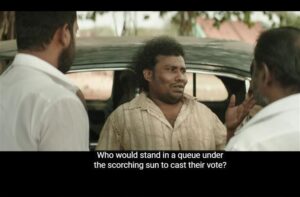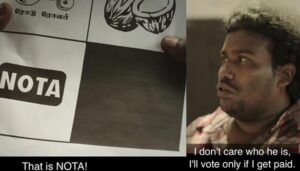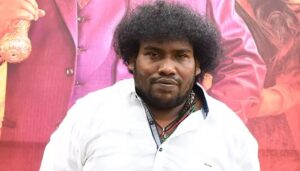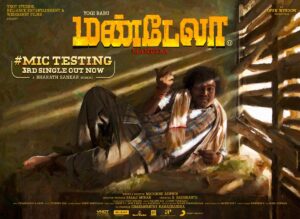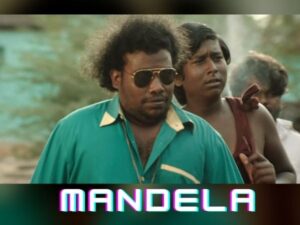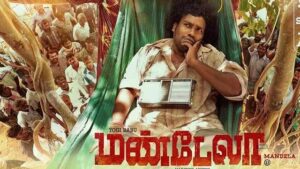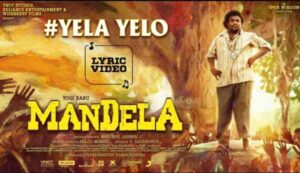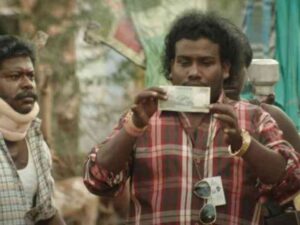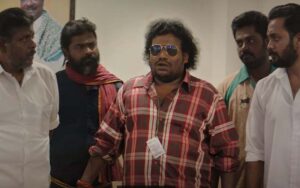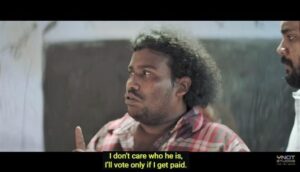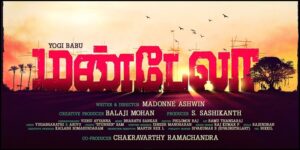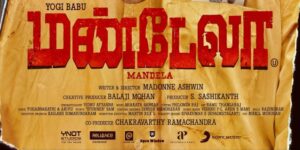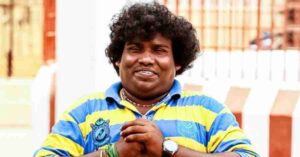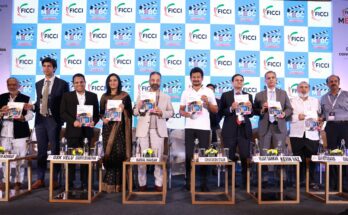Mandela Movie Review
Cast-;
Yogi Babu ,Sheela Rajkumar,Sangili Murugan,G. M. Sundar,Kanna Ravi etc.
Crew-;
Writter -Madonne Ashwin ,Directer – Madonne Ashwin,S ,Music – Bharath Sankar ,Country of origin – India
Original language -Tamil ,Producers – S. Sashikanth , Chakravarthy Ramachandra ,Balaji Mohan ,Cinematography – Vidhu Ayyanna ,Editor – Philomin Raj ,Production companies – YNOT Studios *Reliance Entertainment *Open Window Productions * Wishberry Films ,Distributor – Netflix ,Star Vijay P R O -Nikkil Murugan etc.
Story-;
The story is about two adjoining villages, each of which is dominated by members of one particular caste. The interesting fact is that both villages have great regard for their president (Sangili Murugan), a man who geniu nely wishes to see both communities come together as one. For this reason, he has two wives, one from each community. However, be it his wives or the sons he has through them, people are at loggerheads with one ano ther, each claiming their own caste to be superior to the other. As the old man’s term nears its end, a fight over who should be the first to use a newly built public toilet between the two communities breaks out. It leaves the old man in a semi paralyzed state even as elections are announced.Politicians and their stooges are more inte rested in who is going to become the next president as they want the next president to be as corrupt as they are. They hope to make money selling off the villagers lands to corporates.When both the the old man’s sons get to know how much commission they can make as president, both want the post.The old man however is reluctant to back either of his sons. So, a contest between both sons and the villages that back them begins.
Both decide to contest the elections. The candidates start taking stock of the number of votes they are likely to get and they realise that they both have equal support. They desperately begin looking for that one elusive vote which can help them win the election. It is at this time that they realise that there is one more person in the cons tituency. Th e man is the village’s barber (Yogibabu), who comes under neither village nor is a member of either community.The poor soul, who until then is exploited by villagers from both sides, suddenly finds himself the cen tre of attention after a kind-hearted post woman helps him get an election identity card.For the sake of getting a voter id, she christens him Mandela, after the great Nelson Mandela.Both sides try to win Mandela’s favour by pam pering him with gifts. At one point, their kindness turns into frustration as the man is unsure whom to sup port. Eventually, both sides try to threaten and force him to vote for them. What happens next is what the film is all about.The hero of the film undoubtedly is its director, Madonne Ashwin.
His brilliant screenplay and direction make the film an entertaining affair all the while creating an awareness ab out the true nature of human bein gs.One important aspect about Mandela is that it does not look to present all villagers as being naive, innocent people who are exploited. It shows that villagers too, especially women, can be manipulative, calculative and exp loitative in their own ways.The film’s actors do a fantastic job of playing their parts. Yogi Babu delivers a per for mance that is perfect for the story. The same can be said of actress Sheela Raj kumar, who plays the female lead. For that matter, there is not a single actor, who overdoes his job.Bharath Shan kar’s music and Vidhu Ayyanna’s visuals are a treat to one’s ears and eyes respectively. Philomin Raj’s editing is outstanding as there is not a mom ent’s boredom in the film. Thanks to his tight editing, the film is a treat to wat ch. In short, Mandela is a rock star and definitely stands tall!
Watch The Trailor-;
Movie Review-;
The Tamil film, Mandela starring Yogi Babu and Sheela Rajkumar is the latest film to skip its theatrical release. Mandela Tamil film is streaming on Netflix. Mandela Tamil movie streaming on Netflix from April 4th. Watch Ma ndela with English Subtitles on Netflix. The movie will also release on Star Vijay Channel on the same day. Man dela is a comedy-drama political satire involving an NRI who comes to a constituency to vote fraudulently in the election in which two parties are seriously into vote-buying. It is named after the late South African Presid ent Nelson Mandela.Mandela is written and directed by Madonne Ashwin. Sangili Muru gan, GM Sundar, and Kanna Ravi play other important roles in the movie. Bharath Sankar has composed the music . Director Mado nne Ash win’s Mandela is a fantastic comedy with a deep, meaningful storyline that showcases in a humourous way the deep-rooted caste differences that are prevalent in society even to this day.The film is in a league of its own siply because unlike most other comedy films that release these days, it does not sacrifice logic and content for the sake of comedy.
The film makes you laugh but at the same time, presents the situations in all seriousness and with sensitivity. To make something like this, one requires exceptional skill and director Ashwin, who is only making his debut with Mandela, proves that he is among the exceptional lot.To put it simply, this is more than just tight rope walking. It is tight rope walking with one’s eyes closed while walking in a pair of stilettos! Yogi Babu excels in a film that und erstands caste structure and vote-bank politics Debutante Madonne Ashwin’s ‘Mandela’ is a first-rate political sa tire that shows how deep-seated caste is, by taking an unflinching yet unsentimental look packed in the form of a d ialogue that you may miss noticing — in Mandela, that tells more about caste structure than the film. It arri ves when violence breaks out between two dominant caste groups, the leaders of whom are half-brothers and are pitted against each other in the local body elections. In the raging war between the North and the South, the regions predominantly occupied by the two caste groups, Yogi Babu, a barber, stands in the middle.
Looking at him, a character wonders if he was thekkoru (South) or vadakkuoru (North) and the man next to him says, “He is podhu (public).” Note that he doesn’t own a land. This seemingly inconsequential piece of conversa tion speaks volumes of the mentality of the upper-caste/dominant caste, especially in the way they perceive Dalits as public property that they can possess and poach on. It comes from a place of entitlement and this callo us attitude over the oppressed is the spirit that holds Mandela together, treading a careful line between romant icising caste practices and making a mockery of them. Ahead of the local body elections in Soorangudi, the leade rs of two dominant caste groups coax into getting the vote of a Dalit, as the vote count from their respective cas te comes to a draw. We see the entitlement from the very beginning when Rathnam (GM Sundar) and his cohort organise an inaugural ceremony for a public toilet that they built for their caste, who live in the North. His half-brother, Madhi (Kanna Ravi), is from a supposedly lower yet dominant caste, who fights for the rights of “his” people.
Their patriarch father Ayya (Sangili Murugan) is a Periyar follower and has two wives (from the two castes), in his larger goal to unite these two warring groups and to abolish caste in the village. But that sounds a little conv enient, right? At the inaugural ceremony, a song from Yejaman is played in the background, perhaps, to indicate something. A character from Rathnam’s cohort is always seen removing his footwear every time violence breaks out and seems to be overprotective of it. The two groups are at warheads as to who would inaugurate the toilet — the northerners or southerners? Yes, there is a caste implication in everything, even in what you eat. When Ay ya volunteers and when he passes out, in the ensuing tussle between the two groups outside, they look for an ilic havai (innocent) person to clean up the mess. Do check out the documentary Kakkoos. The ilicha vai in Mandela is Yogi Babu, who does not have a name and is referred as ilicha vai (think of Chappani from 16 Vayathinile). Mo re than anything, he is the podhu that was mentioned in the previous paragraph.
And Mandela is this story of a single person’s struggle in reclaiming a) his identity and b) to break free from the identity that was bestowed upon him by society. Ashwin’s film is born out of a simple idea: half-brothers. Think of Agni Natchathiram. Think of Cheran Pandian. Mandela is more on the lines of the latter, but it ends up correcti ng what the KS Ravikumar film flirted with. One of the things that really work in its favour is how honest and ear ne st the film remains till the very end. And this earnestness seems to come from a place of self-awareness, as As hwin and the makers seem to be aware of their privilege. That, one suspects, is the reason why they have mad e Mandela as a satire. Sometimes, we laugh with them and sometimes, we laugh at them, which is the film’s ach ievement: to draw humour out of a serious issue like caste and vote-bank politics. It is self-aware because it un derstands caste structure. Take this scene, for instance. When Mandela (Yogi Babu, who just owns the film in the second half) is given a buffet of options (of names) to pick from, they narrow down on Nelson Mandela, the for mer President of South Africa.
In that scene, “What if that was an upper-caste name?” That sense of fear is real. The film does not explore the conditions that made people like Mandela an outcast by the same people who are now vying for his vote. Inst ead, what it does get right is to not make the character feel apologetic, like last year’s Serious Men, about the offers that he receives from the caste leaders. The saviour template is (delightfully) inverted. Yet, it is a bit of a drag and sometimes too melodramatic. There is no explicit mention of caste names, or political parties. Every thing is implied and reduced to background information, and we are left to draw our own conclusions. I partic ularly liked how Ashwin had used Ramki as one of the photos you find in Mandela’s saloon. People who grew up in the 90s would know how the actor, like Rajinikanth, was well-known for his hairstyle.For a film like Mandela, you somewhere begin to worry on how it is going to end.
This IS MY Personal Review So Please Go And Watch The Movie In Theaters Only
Written By- T.H.PRASAD -B4U-Ratting-4.5 /5
